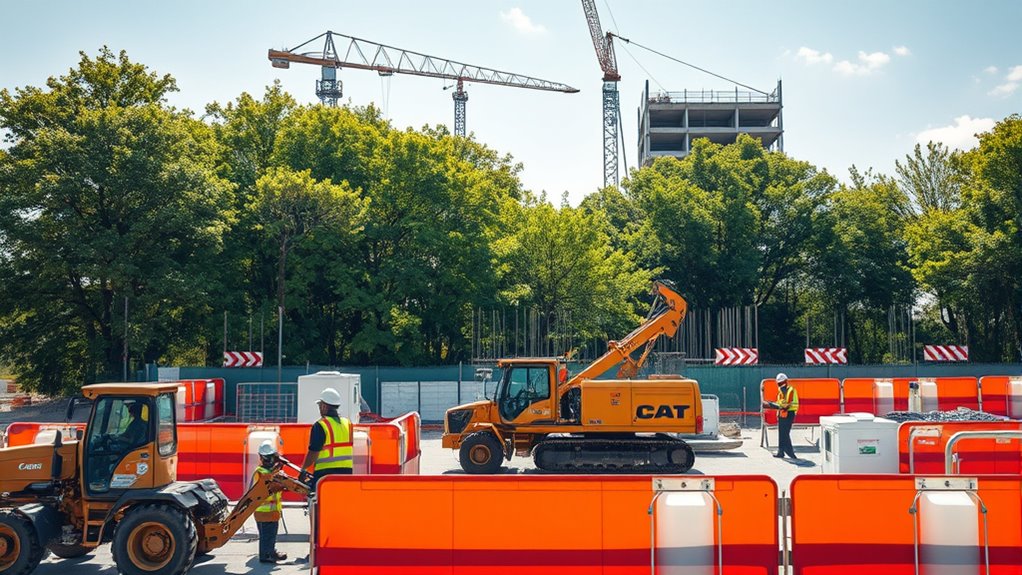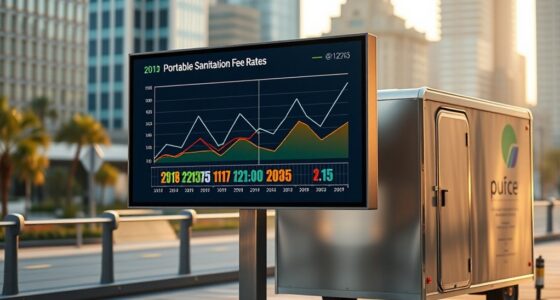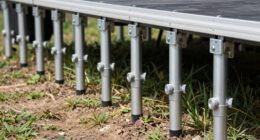You can uncover hidden savings by claiming tax deductions for sanitation and waste management costs on your construction site. Expenses like waste disposal services, portable toilets, recycling efforts, and hygiene facilities are often overlooked but are deductible. Keeping detailed records and invoices guarantees these costs can reduce your taxable income effectively. If you want to discover more about how proper sanitation practices can boost your tax savings, continue exploring these opportunities.
Key Takeaways
- Expenses for waste disposal, portable toilets, and recycling services are deductible, reducing overall tax liability.
- Maintaining detailed records and invoices for sanitation expenses supports maximizing deductions during tax filings.
- Costs related to hygiene facilities, handwashing stations, and cleaning services are eligible for tax deductions.
- Implementing eco-friendly waste management practices may qualify for additional tax credits or incentives.
- Proper sanitation and waste management efforts ensure regulatory compliance and can lead to significant hidden savings.

Are you aware that you might be eligible for deductions related to sanitation taxes? If you’re involved in construction projects, understanding how waste management expenses and hygiene compliance efforts can translate into tax savings is essential. Many overlook these deductions, even though they can markedly reduce your overall tax liability. Proper waste management on construction sites isn’t just about keeping the area clean; it’s also about ensuring you meet regulatory standards and avoid penalties. When you invest in waste disposal services, portable toilets, or recycling initiatives, these expenses often qualify as deductible costs. Keeping detailed records of these expenditures can help substantiate your claims during tax season. Additionally, implementing durable sanitation equipment can enhance your compliance efforts and potentially qualify for additional deductions.
Hygiene compliance is another critical factor that can lead to potential deductions. Construction sites are required to maintain a certain standard of cleanliness to protect workers and prevent environmental hazards. Costs associated with sanitation facilities, handwashing stations, and regular cleaning services are integral to upholding hygiene standards. These expenses, if documented properly, can be deducted from your taxable income. Not only does this support your efforts to stay compliant with health and safety regulations, but it also offers a tangible financial benefit.
Furthermore, waste management practices that reduce environmental impact might qualify you for additional incentives or deductions. Implementing eco-friendly waste disposal methods, recycling programs, or sustainable sanitation solutions demonstrates your commitment to environmental responsibility. In some jurisdictions, these efforts may be recognized through tax credits or deductions, encouraging greener practices on construction sites. Be sure to consult local regulations and keep records of all related expenses, including invoices and service agreements, to maximize your eligible deductions.
Frequently Asked Questions
Are Temporary Sanitation Expenses Deductible During Construction?
Temporary sanitation expenses are generally deductible during construction as part of your construction site hygiene costs. You can write off sanitation equipment costs, including portable toilets and handwashing stations, because they are necessary for maintaining cleanliness and safety. Keep detailed records of these expenses, as they qualify as business-related costs. This approach helps reduce your overall taxable income while ensuring the site remains compliant with health standards.
Can Personal Sanitation Costs On-Site Be Deducted?
Think of construction site hygiene as your secret weapon, much like a knight’s shield. Personal sanitation costs, including sanitation equipment costs, can often be deducted if they directly relate to your business. Keep detailed records of these expenses, as they’re considered essential for maintaining a safe work environment. By understanding these deductions, you can shield your business from unnecessary costs and maximize your tax savings effectively.
Do Different States Have Varying Sanitation Deduction Rules?
You should know that state regulations and local policies vary when it comes to sanitation deductions. Some states offer specific tax incentives or deductions for construction site sanitation, while others don’t. It’s essential to check your state’s tax rules and local policies because they can differ markedly. By understanding these differences, you can maximize your deductions and ensure compliance, saving your project money and avoiding potential penalties.
How Do I Document Sanitation Expenses for Tax Purposes?
Did you know that proper construction site hygiene can reduce project delays by up to 20%? To document sanitation expenses for tax purposes, keep detailed records of all costs related to sanitation equipment and services. Save receipts, invoices, and bank statements, and categorize expenses accurately. Using organized documentation guarantees you can substantiate your deductions easily, making it simpler to claim benefits for construction site hygiene and sanitation equipment costs come tax time.
Are There Specific IRS Forms for Sanitation-Related Deductions?
You might wonder if there are specific IRS forms for sanitation-related deductions. While there’s no dedicated form, sanitation expenses related to your construction site generally qualify for construction tax deductions. You should report these costs on Schedule C or Schedule F, depending on your business type. Make sure your expenses meet deduction eligibility criteria and keep detailed records, so you can substantiate your claims during tax time.
Conclusion
By taking advantage of sanitation-related tax deductions, you could save up to 20% on your construction project costs. Did you know that proper sanitation measures can reduce delays by 15%, keeping your project on schedule? Don’t overlook these hidden savings—they not only lower expenses but also guarantee a smoother build. Stay informed about available deductions, and you’ll maximize your budget while maintaining a safe, compliant construction site.









